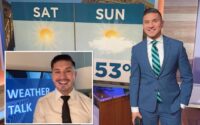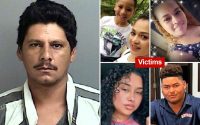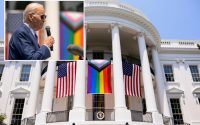Boston Marathon bombing survivors pay tribute to fallen runners 10 years after deadly blast
When Nolan Cleary stepped out onto the Main Street pavement in Hopkinton, Massachusetts, on Monday morning, he carried with him a memory, frozen in time, of the young boy whose death made the world weep.
Martin Richard was just 8 years old when a terrorist’s bomb claimed his life near the finish line of the Boston Marathon in 2013. And he became known across the globe as the young victim once photographed holding a handwritten sign that, “No more hurting people – Peace.”
Cleary, an 18-year-old student at Purdue University, told the Boston Globe the pair were inseparable in their youth. So a decade after the dreadful bombing, Cleary and two childhood friends chose to run the marathon for the Martin Richard Foundation, the charity Martin’s parents set up in the wake of his death.
“It’s just always something I’ve wanted to do,” Cleary told the paper. “We just wanted to do it for Martin.”
He isn’t the only one using Beantown’s great race — now in its 127th year — as a way to honor those who fell during the bombing, a domestic terror attack by two radicalized brothers that struck at the cradle from which American liberty sprung.
The April 15 explosions killed three people, injured hundreds more and left 17 missing limbs. It also led to one of the greatest manhunts in American history as authorities ceaselessly pursued the ethnic Chechen terrorists, Dzhokhar and Tamerlan Tsarnaev.

Tamerlan died during a shootout with police. Dzhokhar remains on death row for his crimes.
Meanwhile, survivors have forged ahead, steadfast in their determination to not let the brothers’ dastardly act collapse their lives.
Adrianne Haslet was a ballroom dancer who just happened to be walking down Boylston Street when the second bomb exploded. She lost her left leg just below the knee.


But that didn’t stop her. She learned to walk with a prosthetic and vowed to return to dancing. And she started running marathons, completing the Boston course for the first time in 2016.
On Monday, she was broadcasting on Instagram live from the starting line, cheering on about 30,000 runners as they off pushed off into the foggy New England morning.
“We are here!” she said, smiling and waving at the camera. “This is incredible! This is amazing. And it’s going to go by too fast.”
Marc Fucarile was always an athlete — he told People magazine that he played football, ran track and loved ice hockey.

Then the second of the brothers’ homemade pressure-cooker bombs detonated right next to him and blew out his eardrums, torched his lower body, severed his right leg and forced him into years of skin grafts and surgeries.
He told the magazine he’d be riding a hand cycle the 26.2 miles from the race’s starting point in Hopkinton to its Copley Square finish line to thank those who supported him and the other survivors. And to show his son that “you can really accomplish anything you put your mind to.”
After he crossed the finish line Monday afternoon, he told the WCVB-TV in Boston that he was “living the dream.”

“It was great,” Fucarile told the station. “The crowd was amazing. The people were great. Just had fun.”
Then there’s Henry Richard, Martin’s now 21-year-old brother.
The bombing simply devastated his family — Martin wasn’t the only casualty. The explosion also robbed his sister, Jane, of her left leg and left his mom, Denise, blind in one eye.
His dad, Bill, also had his eardrums blown out and took a blast of shrapnel to his legs.

But Henry returned to Boylston Street last year to run the race, collapsing into his family’s arms as he crossed the finish line, his arms raised in triumph.
He was back again on Monday, clad in yellow and blue as he smiled and waved at a local reporter who photographed him crossing into Brookline, Massachusetts.
He finished the race just after 4 p.m., the Globe said, with his brother’s name written across his arm. Cleary crossed the finish line about 20 minutes later.
Race day was rainy and overcast.
But for at least some of the people who bear the scars of Boston’s bloodiest day, the sun is finally shining through.
With Post wires


